When it comes to caring for children, being prepared for emergencies is not just reassuring – it's essential. Children experience the world differently than adults; they explore with curiosity, lack awareness of potential dangers, and their bodies respond differently to injuries and illnesses. That's why specialised Paediatric First Aid training is crucial for anyone responsible for young lives, whether professionally or personally.
At SafeHands Health & Safety Solutions, we understand that children deserve caregivers who are confident and competent in responding to emergencies. Our comprehensive Paediatric First Aid Training equips individuals with the specific skills needed to provide immediate care to infants and children until professional medical help arrives.
Table of Contents
- Why Paediatric First Aid Differs from Standard First Aid
- Common Paediatric Emergencies
- Benefits of Paediatric First Aid Training
- Safehands' Paediatric First Aid Training Programme
- Who Should Attend Paediatric First Aid Training?
- Implementing Paediatric First Aid in Your Organisation
- Real Impact: Case Studies
- The Importance of Regular Updating
- Taking the Next Step
- Contact Information
Why Paediatric First Aid Differs from Standard First Aid
Children are not simply small adults. Their anatomy, physiology, and psychological needs differ significantly from those of adults, requiring specialised knowledge and techniques:
- Anatomical differences: Children have smaller airways, more flexible bones, and different body proportions
- Physiological differences: Children have faster respiratory and heart rates, different vital sign ranges, and respond differently to shock and trauma
- Psychological differences: Children may be unable to communicate symptoms clearly and often experience heightened fear during emergencies
- Injury patterns: Children are vulnerable to unique injury patterns related to their developmental stages and exploratory behaviours
These differences mean that applying adult first aid techniques to children without modification could be ineffective or potentially harmful. Paediatric First Aid training addresses these differences, teaching age-appropriate techniques for infants (0-1 year) and children (1-18 years).
Common Paediatric Emergencies
Our Paediatric First Aid training covers a comprehensive range of emergencies that commonly affect children, including:
Respiratory Emergencies
- Choking (foreign body airway obstruction)
- Asthma attacks
- Croup
- Bronchiolitis
- Respiratory infections
- Allergic reactions affecting breathing
Respiratory emergencies are particularly critical in children as their narrower airways mean they can deteriorate rapidly. Our training teaches recognition of respiratory distress signs and appropriate interventions.
Injuries and Accidents
- Falls and head injuries
- Fractures and dislocations
- Cuts, grazes, and bleeding
- Burns and scalds
- Drowning and near-drowning incidents
- Foreign objects in eyes, ears, or nose
- Poisoning
- Bites and stings
Children's natural curiosity and developing coordination make injuries common. Our course covers assessment techniques and appropriate first aid interventions for these incidents.
Medical Emergencies
- Seizures and febrile convulsions
- Meningitis
- Diabetic emergencies
- High temperatures and fevers
- Dehydration
- Anaphylaxis
- Shock
Recognising serious illness in children can be challenging. Our training focuses on identifying concerning symptoms and providing appropriate emergency care.
Life-threatening Emergencies
- Unconsciousness
- Cardiac arrest
- Respiratory arrest
- Severe bleeding
- Anaphylactic shock
While rare, these emergencies require immediate, confident intervention. Our training includes practical instruction on paediatric CPR, AED use, and other life-saving techniques.
Benefits of Paediatric First Aid Training
Investing in Paediatric First Aid training through SafeHands offers numerous benefits:
For Individuals:
- Confidence in emergencies: Replace panic with purposeful action through practiced skills
- Peace of mind: Know you're prepared to help a child in distress
- Transferable skills: Apply knowledge in any setting where children are present
- Professional development: Enhance your CV and employment prospects in childcare and education
- Family safety: Better protect your own children and family members
For Organisations:
- Legal compliance: Meet regulatory requirements for childcare settings, schools, and youth organisations
- Reduced risk: Minimise the impact of accidents through prompt, appropriate intervention
- Enhanced reputation: Demonstrate commitment to children's safety and wellbeing
- Staff confidence: Empower staff to handle emergencies confidently and competently
- Improved safety culture: Foster an environment where safety awareness becomes second nature
For Children:
- Better outcomes: Receive appropriate care immediately when accidents or illnesses occur
- Reduced anxiety: Benefit from calm, confident adults during frightening situations
- Faster recovery: Experience less severe consequences due to prompt, effective first aid
- Safety education: Learn age-appropriate safety awareness from knowledgeable adults

Safehands' Paediatric First Aid Training Programme
At Safehands, we pride ourselves on delivering exceptional Paediatric First Aid training that balances theoretical knowledge with practical skills. Our comprehensive programme is designed to meet the needs of diverse learners while ensuring they gain the confidence to apply their skills in real-world situations.
Course Content
Our Paediatric First Aid training covers all essential aspects of emergency care for infants and children:
- Emergency planning and preparation: Creating safe environments and preparing for potential emergencies
- Primary assessment: The systematic approach to assessing a child in an emergency
- Basic Life Support: Age-appropriate CPR techniques for infants and children
- Automated External Defibrillator (AED): Safe and effective use with children
- Choking management: Techniques for clearing airway obstructions in different age groups
- Wounds and bleeding: Controlling different types of bleeding and wound care
- Shock recognition and management: Identifying and responding to various types of shock
- Head, neck, and spinal injuries: Assessment and immobilisation techniques
- Bone, joint, and muscle injuries: Recognition and appropriate first aid for fractures, dislocations, and soft tissue injuries
- Burns and scalds: Assessment of burn severity and appropriate treatment
- Eye, ear, and nose injuries: Management of foreign bodies and common injuries
- Poisoning, bites, and stings: Identification and appropriate first aid responses
- Medical conditions: Recognition and management of asthma, epilepsy, diabetes, and meningitis
- Extreme temperatures: Dealing with hypothermia and hyperthermia
- Psychological support: Providing emotional comfort during emergencies
Training Approach
Our training methodology is designed to maximise engagement and knowledge retention:
- Expert instruction: All courses are delivered by experienced trainers with backgrounds in emergency care and childcare
- Practical focus: Hands-on practice with specialised paediatric manikins and equipment
- Scenario-based learning: Realistic simulations of common paediatric emergencies
- Small group sizes: Ensuring personal attention and adequate practice time
- Supportive environment: Creating a positive learning atmosphere where questions are encouraged
- Comprehensive resources: Take-home materials for ongoing reference and refreshment of knowledge
- Flexible delivery: Options for on-site training at your organisation or attendance at our training centre
Certification and Compliance
Our Paediatric First Aid course meets or exceeds all relevant regulatory requirements:
- Fully compliant with the standards for first aid training
- Aligns with the requirements for Early Years settings and schools
- Certification valid for 2-3 years (depending on specific regulatory requirements)
- Certificates issued promptly upon successful completion
- Reminder service for recertification
Who Should Attend Paediatric First Aid Training?
Our Paediatric First Aid course is essential for:
Childcare Professionals:
- Early years practitioners
- Childminders
- Nursery staff
- Playgroup leaders
- After-school care providers
- Nannies and au pairs
Education Staff:
- Primary school teachers
- Teaching assistants
- School nurses
- Playground supervisors
- Sports coaches
- School trip supervisors
Youth Organisation Leaders:
- Youth club workers
- Scout and Guide leaders
- Sports team coaches
- Activity centre staff
- Summer camp counsellors
Healthcare Practitioners:
- Paediatric nurses
- Dental nurses
- Healthcare assistants
- Therapy assistants
- Medical receptionists
Parents and Caregivers:
- New and expecting parents
- Grandparents
- Foster carers
- Babysitters
- Anyone caring for children regularly
Implementing Paediatric First Aid in Your Organisation
Establishing effective first aid preparedness involves more than just training. We recommend a comprehensive approach:
i. Risk Assessment
Begin by assessing the specific risks in your environment:
- Age groups present and their specific needs
- Common activities and associated risks
- Site-specific hazards
- Existing medical conditions among children in your care
ii. Training Planning
Develop a training strategy that ensures:
- Sufficient coverage of trained staff at all times
- Regular refresher training
- New staff training as part of induction
- Specialised training for specific needs (e.g., children with medical conditions)
iii. Equipment and Resources
Ensure appropriate equipment is available:
- Age-appropriate first aid supplies
- Emergency medication storage
- Clear emergency action plans
- Accessible emergency contact information
- Communication systems for summoning help
iv. Policy Development
Create clear policies covering:
- Emergency response procedures
- Documentation of incidents
- Parental notification protocols
- Staff responsibilities
- Regular equipment checks
iv. Regular Review
Maintain effectiveness through:
- Periodic drills and simulations
- Review of actual incidents for learning
- Updates to reflect changing needs or regulations
- Regular equipment audits
Real Impact: Case Studies
Organisations have benefited from our Paediatric First Aid training:
"The Paediatric First Aid training from SafeHands was exceptional. Just two weeks after completion, one of our staff confidently managed a choking incident with a 2-year-old. The practical emphasis of the training meant she acted without hesitation, potentially saving a life." - Manager, Dublin Daycare Centre
"As a primary school, we've always taken first aid seriously, but Safehands' specialised paediatric training transformed our approach. Their scenario-based learning helped our staff bridge the gap between theory and practice. When a pupil had a severe allergic reaction during a school trip, our trained staff member's confident response was remarkable." - Headteacher, County Cork
"The on-site training SafeHands provided for our playgroup staff was not only convenient but tailored to our specific setting. The trainer incorporated scenarios relevant to our outdoor forest school approach, making the learning directly applicable to our daily activities." - Director, Nature Playgroup, Galway
The Importance of Regular Updating
First aid knowledge and guidelines evolve. Regular refresher training ensures:
- Techniques remain current with latest guidelines
- Skills stay sharp through regular practice
- Confidence remains high for emergency situations
- New developments in paediatric emergency care are incorporated
- Compliance with regulatory requirements is maintained
We recommend refresher training at least every 2 years, with annual skills practice sessions for optimal readiness.
Taking the Next Step
In environments where children are present, being prepared for emergencies isn't optional—it's an essential responsibility. SafeHands is committed to equipping caregivers with the knowledge, skills, and confidence to respond effectively when a child needs help.
Our Paediatric First Aid Training offers not just compliance with regulations, but genuine preparedness that could make a life-changing difference in an emergency.
Whether you're an individual seeking to better protect the children in your life, or an organisation looking to train your entire team, we offer flexible, high-quality training solutions to meet your needs.
Contact Information
Website: www.safehands.ie
Email: info@safehands.ie
Phone: +353 1 7979836 | +353 87 3823223

